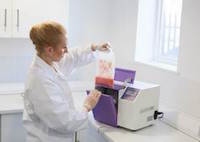Channels
Special Offers & Promotions
Seward Stomacher Used for Large Scale Campylobacter Study
UK Food Standards Agency report demonstrates risk of Campylobacter contamination in all chilled chickens at retail sale
 Seward Ltd., manufacturer of the world leading range of original Stomacher® paddle blenders and accessories used in sample preparation for microbiological analysis, announces the use of its Stomacher® technology for the preparation of samples for a UK-wide Campylobacter study. Foodborne Campylobacter makes over 280,000 people ill each year in the UK alone and is one of the main bacterial causes of food poisoning globally.
Seward Ltd., manufacturer of the world leading range of original Stomacher® paddle blenders and accessories used in sample preparation for microbiological analysis, announces the use of its Stomacher® technology for the preparation of samples for a UK-wide Campylobacter study. Foodborne Campylobacter makes over 280,000 people ill each year in the UK alone and is one of the main bacterial causes of food poisoning globally.
A recent survey of chicken meat purchased from major UK retailers has demonstrated the ubiquitous presence of Campylobacter species awaiting the unwary or poorly skilled cook. The project was undertaken by the UK Food Standards Agency (FSA) using both public and private microbiology laboratories to produce the data. The samples processed were chicken skin and sponge swabs taken from chicken carcasses. The FSA is working with government and industry to try to reduce the incidence of Campylobacter in chicken meat by 2015, a target the report suggests they will struggle to achieve1.
The Stomacher® paddle blender was used to process both chicken skin and sponge swabs in order to maximise bacterial recovery at the pre-enrichment phase, ensured by the Stomacher’s patented paddle design. Furthermore, the protocol adopted stressed the need for preventing cross contamination between samples which the Stomacher methodology also safeguards through use of irradiated sterile Stomacher bags. The sponge swab technique followed by extraction in the Stomacher has also been shown to be a superior method to swab sticks, generating a more representative result.2
If elimination of Campylobacter is proving a challenge, then close monitoring and epidemiological studies will be keeping microbiologist busy for the foreseeable future. “The traditional techniques of horizontal isolation of Campylobacter are reliable but slow. New real-time PCR techniques require shorter pre-enrichment following Stomaching which could reduce time to result to just 24 hours, to potentially enable processors to clear products before shipping,” said Stuart Ray, Technical Director, Seward Ltd. “The quality of the sample produced by the Stomacher is essential for the reliability of this new approach.” A study of this technique applied to Salmonella in chicken demonstrates its advantages.3
Media Partners


